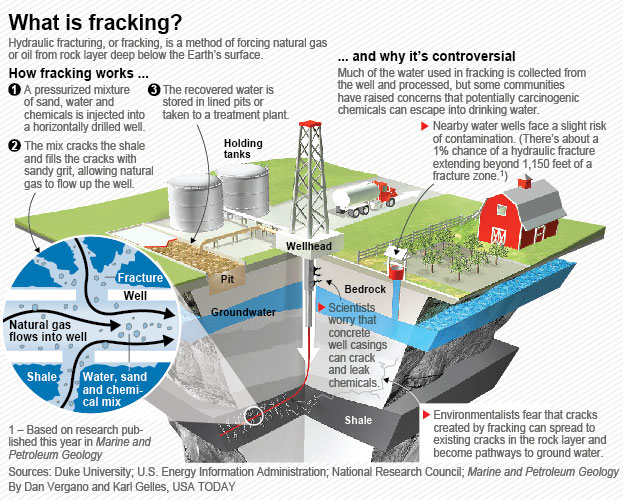Monday, Feb 18, 2013
The Office of Sustainability will allow the Rider community to hear “both sides of the story” when it sponsors a Forum on Fracking on Thursday, February 21, in the Bart Luedeke Center Theater at 7 p.m.
Learn more about the controversial natural gas-extraction process of hydraulic fracturing when Rider’s Office of Sustainability presents a Forum on Fracking on Thursday, February 21, at 7 p.m. in the Bart Luedeke Center Theater on the Lawrenceville campus. A panel of four experts from varied environmental, energy and chemical organizations will discuss an array of opinions and perspectives during the moderated, balanced two-hour forum, which is free and open to the public. Rider University is located at 2083 Lawrenceville Road (Route 206 South).
Maya K. van Rossum of the Delaware Riverkeeper Network; James E. Benton ’73, M.P.A. ’76, of the New Jersey Petroleum Council; Elvin Montero of the Chemistry Council of New Jersey; and Kate Millsaps of the Sierra Club’s New Jersey Chapter, will discuss the pros and cons of fracking, the process of extracting natural gas from shale rock layers deep within the earth. Fracking makes it possible to produce natural gas extraction from shale plays, such as the Marcellus Shale in Pennsylvania, that were once unreachable with conventional technologies. Three-dimensional imaging helps scientists determine the precise locations for drilling.
Horizontal drilling (along with traditional vertical drilling) allows for the injection of highly pressurized fracking fluids into the shale area. This creates new channels within the rock from which natural gas is extracted at higher than traditional rates. This drilling process can take up to a month, while the drilling teams probe more than a mile below the Earth’s surface. The well is then cased with cement to ensure groundwater protection, and the shale is hydraulically fractured with water and other fracking fluids (Source: http://www.what-is-fracking.com/).
Debate over the environmental impact of the process remains lively, and provides the basis for Rider’s Fracking Forum, which will be moderated by Louis Chebetar ’13, current chair of Rider’s Student Government Association clubs and organizations committee.
Maya Van Rossum has served as the Delaware Riverkeeper and leader for the Delaware Riverkeeper Network, the only citizen action organization that works the entire length and breadth of the Delaware River and its watershed speaking and working for both its protection and its restoration, since 1994. Van Rossum has been appointed by governmental officials to a variety of committees informing state and regional policy and regulation in a wide array of water quality, quantity and habitat matters including in the areas of flooding, floodplain protection, storm water runoff, oil spills, water withdrawals, toxic and other pollution discharges. A former adjunct professor and director of the Environmental Law Clinic at Temple’s Beasley School of Law, she served multiple times as faculty on the Pennsylvania Bar Institute’s Environmental Law.
James E. Benton joined the New Jersey Petroleum Council in 1979 and was named executive director in 1983. As the primary representative of the petroleum and natural gas industry in New Jersey, Benton has more than 30 years of experience in energy policy and research, supply, transportation, refining and marketing. He has testified on all aspects of oil and natural gas policy before the New Jersey Legislature and regulatory agencies, and has particular expertise in spill prevention, having been the lead industry representative in the New Jersey/New York BiState response to a series of incidents in New York Harbor in 1990. A former mayor of nearby Pennington, Benton is a graduate of Rider University, where he earned a Master of Public Administration and a bachelor’s degree in Political Science and Public Administration.
Elvin Montero is the director of communications and issues management for the Chemistry Council of New Jersey, a trade association and business advocacy organization representing 70 large and small companies that are a part of the state’s chemical, pharmaceutical, consumer products, flavor and fragrances, petroleum refining, and precious metals industries. As spokesperson for the state’s $28 billion chemistry industry, Montero is responsible for ensuring that the industry’s priority issues, such as chemical plant security, energy, and safety are properly executed and that the industry’s interests are consistently shared with the appropriate state officials and agencies on a regular basis. He regularly represents the Council on various committees, including the New Jersey Domestic Security Task Force’s Infrastructure Advisory Committee.
Kate Millsaps is a conservation program coordinator for the Sierra Club, New Jersey Chapter. She has been active in statewide and local environmental issues, previously working for the New Jersey Highlands Coalition and the New Jersey Environmental Federation. Millsaps, who graduated from Ramapo College with degrees in International Studies and Environmental Studies, currently serves as a trustee of the New Jersey Highlands Coalition and has served on the Clinton Township Environmental Commission.
For more information, contact Melissa Greenberg, Rider’s sustainability manager, at 609-896-5000, ext. 7559, or megreenberg@rider.edu.

